Vlogging gang culture in Trinidad and Tobago: Glorification or reality?
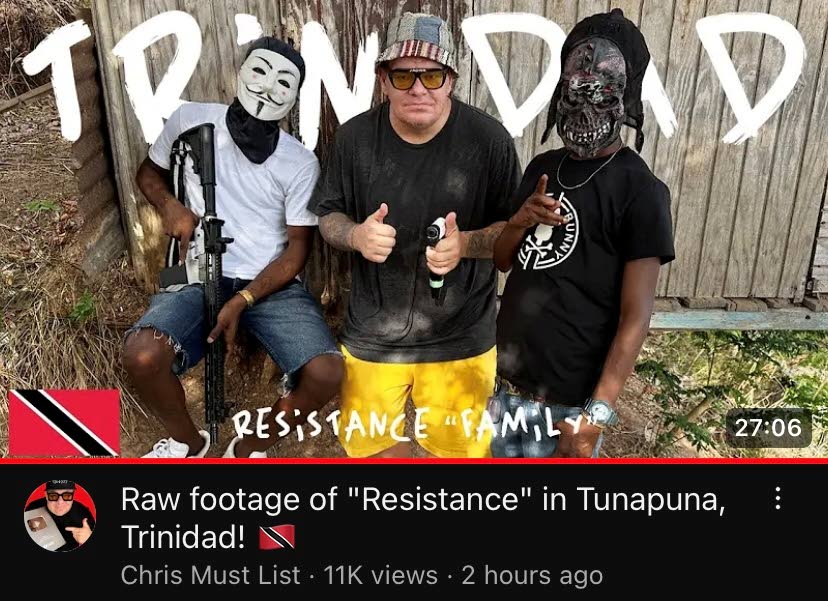
THERE has been an increasing trend of vloggers/YouTubers visiting Trinidad and Tobago to showcase gang culture and violence.
Typically, they visit areas deemed crime hotspots, saying their intent is to “show the good” despite the negative reputation. However, more recently, these videos have caught the attention of the police as civilians have been openly bearing firearms, saying they are in gangs and discussing their involvement in ongoing wars.
The public has been generally divided on this issue. Some think the vloggers are using or taking advantage of people of a lower socio-economic class for likes and views, while others support them, saying they are showing there is more to these areas than violence, as well as showcasing reality.
So far, for 2024, YouTubers Shai “Coco Boy” Noymark, Timmy Karter, and Chris Must List have visited TT and done these videos, which have racked up millions of views. Each of them also did several non-gang-related videos while here, which did not get as many views. They have also done these types of videos in several other countries. Noymark is from Israel, Karter is from Greece and Chris is from Canada.
A similar video was done in 2014 by international media outlet Vice News, which now has over nine million views. It is titled Corruption, Cocaine and Murder in Trinidad.
Vloggers defend their content
Karter’s video, titled Deep into the Caribbean's Deadliest Hood, has had over 1.8 million views. He documented a visit to Laventille, where many locals in downtown Port of Spain urged him not to go.
Residents of the communities told him while there is a negative stigma about both areas, they are guided by peace and love. Among the people he spoke to was Trinibad artiste Kashif “Kman 6ixx” Sankar.
A man featured in the first video called “El Chapo” told Karter although many call Sixx/6ixx a gang, it is just a Trinibad music movement. However, he added, those on the “Seven side” have issues with people from his area. He also showed Karter one of his guns, which he said is for protection. He then warned him not to go over “to the other side” because as a tourist, they would rob him while they kill him.
Speaking to Newsday, Karter said he had never heard about TT before and, “When I don’t know about a place (country), I love it. It’s a bit risky because you don’t know if there’s a demand for (content from that country on YouTube).
“I like doing this. I go (to these places) and my goal is to show that it’s not only about gangs. There are families and humble people living there. All these places have very humble people that also deserve attention.”
He said some locals told him he would get kidnapped and killed if he went to Laventille.
“The crime situation in my home country is ten times worse. Because it’s Europe, people think it’s a paradise but it’s terrible – it’s dangerous as well.”
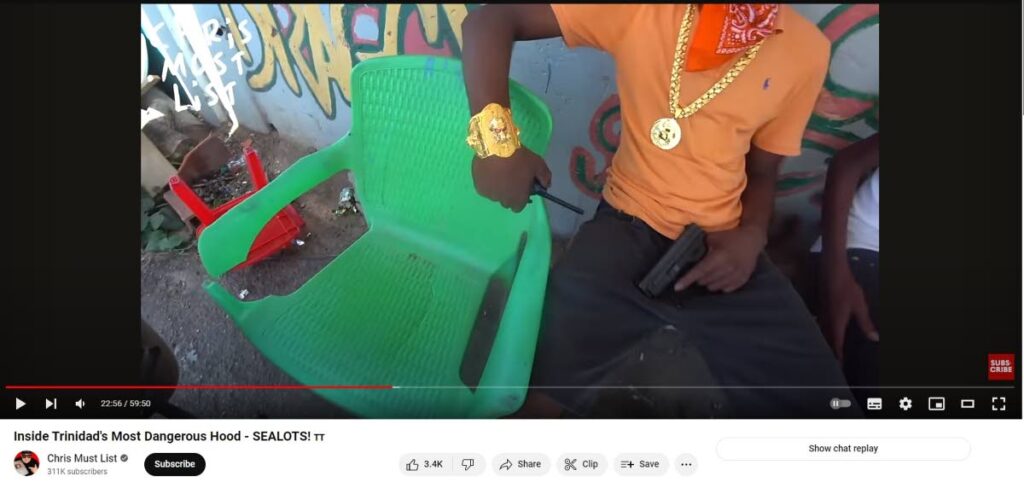
Many took issue with the title of his video. He said he uses such titles on purpose and based on “how mainstream media describes the place.
“Negative titles sell more. If you put, ‘The lovely hood of Trinidad,’ people won’t click it.
“But once you click the video and watch the whole thing, you’re going to see the exact opposite. My intent was to show the good side.”
He said he felt “a bit sad” after leaving as he could not understand why there are gang wars there.
“It’s the same people, same culture, same accent, same place, similar houses, they eat the same food…These are young kids fighting with each other and it was a sad thing.”
He said everyone he encountered there treated him well.
Newsday also spoke to Noymark, whose video on a visit to Laventille titled Be Careful They Can Shoot Us at Any Moment, has had over 430,000 views. He also visited Sea Lots in a video titled Can Peace Prevail In The Gang War Zone Of The Caribbean, which has had over 150,000 views.
He told Newsday he heard “a lot of good things” about TT while he was in Jamaica.
“When I arrived, it took me like three-four days to understand where I want to explore. Then I said to myself, I want to go see the worst neighbourhood in Trinidad to see how they will welcome me.
“Most of the times, people are caught up in the idea that if you enter these neighbourhoods, something bad will happen to you and there are bad people. But I want to show there are normal people there and it’s not as bad as they think it is.”
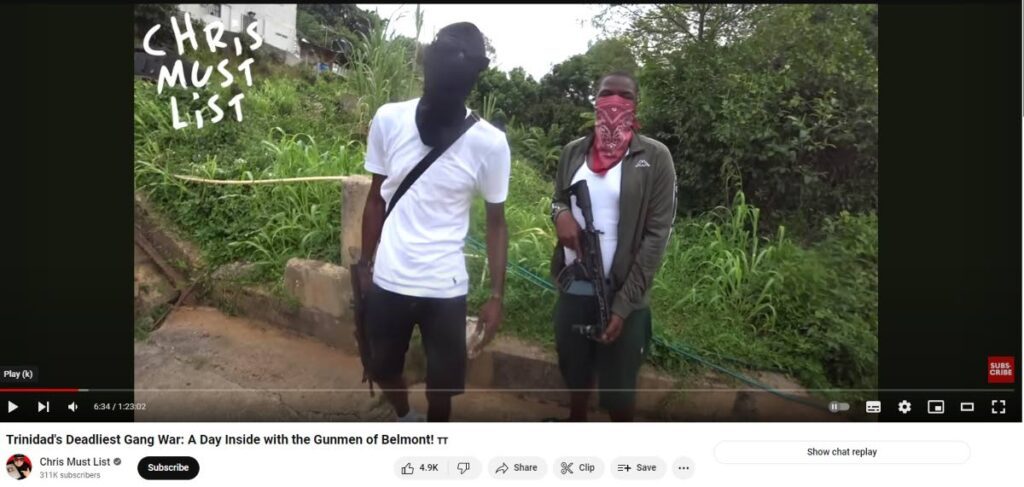
Responding to comments saying such vloggers are taking advantage of these communities, he said while he is making money from the videos, he is not doing that “because these people had no problem being on the camera.
“They agreed, some asked me to blur their faces…In the end, they have permission, they agreed. I didn’t force anyone to do that.”
He added, “If you choose to be on the cam with your face shown, that’s a risk. Be prepared for (the possibility of) police coming (for you) the next day or the next week.”
He, too, said the community showed him love.
Unlike the other vloggers who had just one or two videos visiting such communities, Chris Must List has over ten. Each of them have over 100,000 views. He preferred not to give his full name.
He told Newsday he noticed the views on his non-gang-related content are very low in comparison.
“I wish my best viewed video was at the beach or the peace rally, when in reality, people don’t want to watch that kinda content.”
In his more recent videos, people have been showing off their firearms, and clips from those began circulating on other social media platforms.
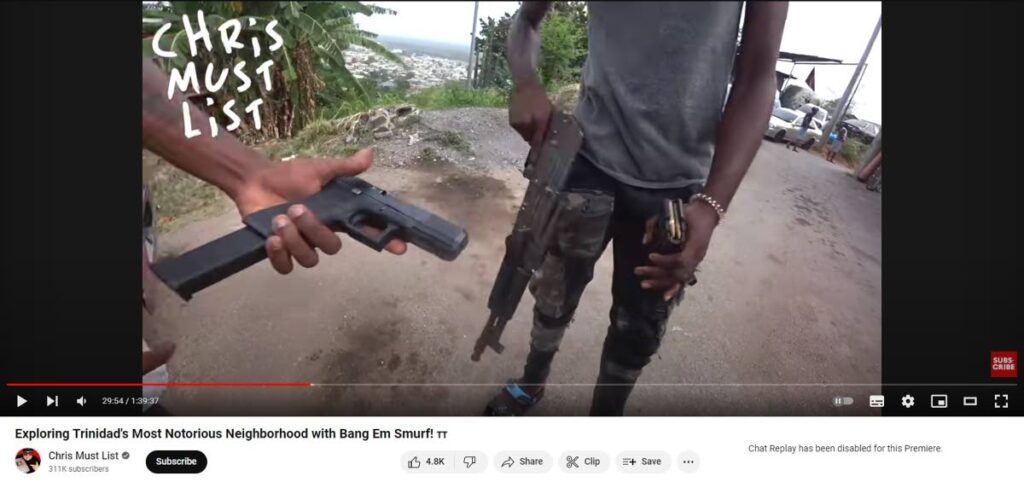
Asked to comment on the complaints about showing people with guns, he said the same people who complain about it are the ones watching it.
“People have a problem with videos showing guns, but not the murders, not the fact that innocent women and children are being killed.
“The people in Trinidad know that murder is a problem and gang activity is a problem, they just don’t want me as a tourist coming here to highlight it.”
He said it has been “all love” when it comes to his interactions with residents here.
Asked if he believes he is achieving his goal of showing reality, he said he does not think he will “ever get reality.
“I’m not naive enough to not know people lie to me on camera. Every neighbourhood says, 'Peace and love,' but I know some of these same people have killed other people.
"(But) I can’t upset people when I’m in their community. It’s not whether I believe it or not. It’s not reality, but as close to reality as I could get.”
He added that his videos are research-based, so he considers himself a journalist.
“Sometimes it takes me seven days of back-and-forth and getting the questions approved. I’m not just a guy walking in with a camera – that’s a YouTuber. I’m a journalist. I don’t need a degree (in journalism). Some of the places I go, traditional journalists can never go there.”
In a video he uploaded on Friday titled Raw footage of 'Resistance in Tunapuna, Trinidad, he explained this particular video was shorter than usual. He said while filming, there was a police operation that caused everyone there to "scatter."
On Thursday, just hours after doubles vendor Anisha Hosein was freed by her kidnappers, police investigating leads in Upper St Michael Road, off St John's Road, St Augustine, killed four men in a reported shootout.
The mountainous area, also known as The Zone by residents, is frequented by members of the Resistance gang and was one of many places police searched in their bid to rescue Hosein, who was kidnapped on May 18.
Chris told Newsday for now, he is done with this type of content in TT.
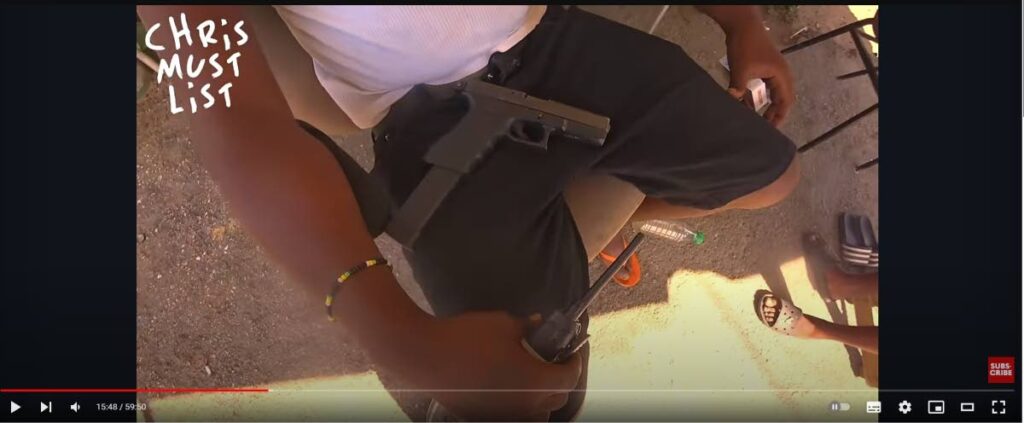
“I want my last few videos to (be) about the culture.
“When I leave here, I want to be loved, not hated. I don’t want to be the guy who only did that type of video.”
The Canadian is 45 and aims to visit every country by age 50.
Police: We are monitoring
DCP of operations Junior Benjamin told Newsday the police are taking these videos “very seriously.
“We are dealing with people from this country who seem to be engaged in the public arena with things that resemble...firearms and are not ashamed.”
He said all such videos are “engaging the attention of some of our investigators, and we are looking seriously into the people (in the video) to see if we can identify them.”
He said this type of content does not help TT as it “gives the image that we are controlled by gangs.
“We are saying no, that is not the norm, that is an exception, and we will deal with it with a very thorough hand. We will have a zero-tolerance approach.”
In many of the videos, people outline what led them to these lifestyles, with some of the main reasons being poverty and lack of job opportunities.
Benjamin said, “There are a lot of things that could be the cause of people taking matters into their own hands. But we have to try a holistic approach.
“It will take much more than the police to deal with these matters. Everybody must be involved (including) the Judiciary, the public, businessmen, legislators…Everybody must contribute to eliminating the problem.”
On some public claims the vloggers may be working with the police, he said there is “absolutely no truth to that.
“The police doesn't make any negotiations with gunmen and drug dealers.”
The Anti-Gang Act says a person who professes to be a gang leader or member to intimidate others or gain benefits, performs an act to gain gang membership, or is, in fact, a gang member can face up to 25 years in jail.
Behavioural psychologist weighs in
Behavioural psychologist Steve Bailey told Newsday he has worked with several young people who had given up on getting an education or starting a career and managed to overcome this.
“Getting up, going to school, studying takes a lot of dedication and for that to happen successfully, you need to set a goal for yourself…But if what they are seeing on social media is that you can get a gun and get rich quick and feel a sense of belonging in a gang, then what’s going to happen?”
In some of the videos mentioned, the vloggers asked adults if they believe the children around them would be influenced by their lifestyles. They said no, and some even told young people to stay off the streets as it “has nothing for them.”
Bailey begged to differ.
“They will be (influenced).
“The teenager looking for a sense of belonging and seeing people feeling unity in a gang would look at you as some type of hero.
“Social media can be giving young people the impression that there’s an easier pathway to getting a good income, managing yourself through life.”
He believes these videos are glorifying gang culture and violence.
Newsday asked Tourism Minister Randall Mitchell whether he believes these types of videos can affect the tourism industry, but he opted not to comment.
Foreign embassies/high commissions respond
Newsday asked the US Embassy, as well as the Canadian and UK High Commissions, whether the popularity of these videos may hinder people from those countries from visiting TT.
A US Embassy spokesman said the US State Department's greatest responsibility is keeping overseas US citizens safe. The person said the embassy is "committed to providing US citizens with the most up-to-date, fact-based, accurate, and transparent information to keep (them) informed when they are abroad.
"Department of State Travel Advisory levels are based on established risk indicators such as health, crime, terrorism, kidnapping or hostage taking, civil unrest, natural disasters, and other potential risks.
"Each country’s level is based on an assessment of domestic conditions that might affect the welfare or safety of US citizens."
The Canadian High Commission shared similar sentiments, saying it issues travel advice and recommendations in the interest of safety "to enable travellers to make their own informed decisions regarding destinations.
"The decision to travel is the sole responsibility of the traveller.
"The government of Canada closely monitors safety and security conditions abroad 24 hours a day, seven days a week, using a wide array of information sources."
And the UK High Commission said its Foreign, Commonwealth and Development Office "provides advice about risks of travel to help British nationals make informed decisions about international travel.
"We constantly review our travel advice to ensure it includes up-to-date information and advice on the most relevant issues for British people visiting or living there.
"We update travel advice as quickly as possible if we are aware of an incident that might significantly affect British people travelling or living in the area."
It added that it is the responsibility of each traveller to plan a safe trip and make decisions on whether a location is safe.
"Each individual trip is different and each person has their own very different view of what an acceptable level of risk means for them."

Comments
"Vlogging gang culture in Trinidad and Tobago: Glorification or reality?"